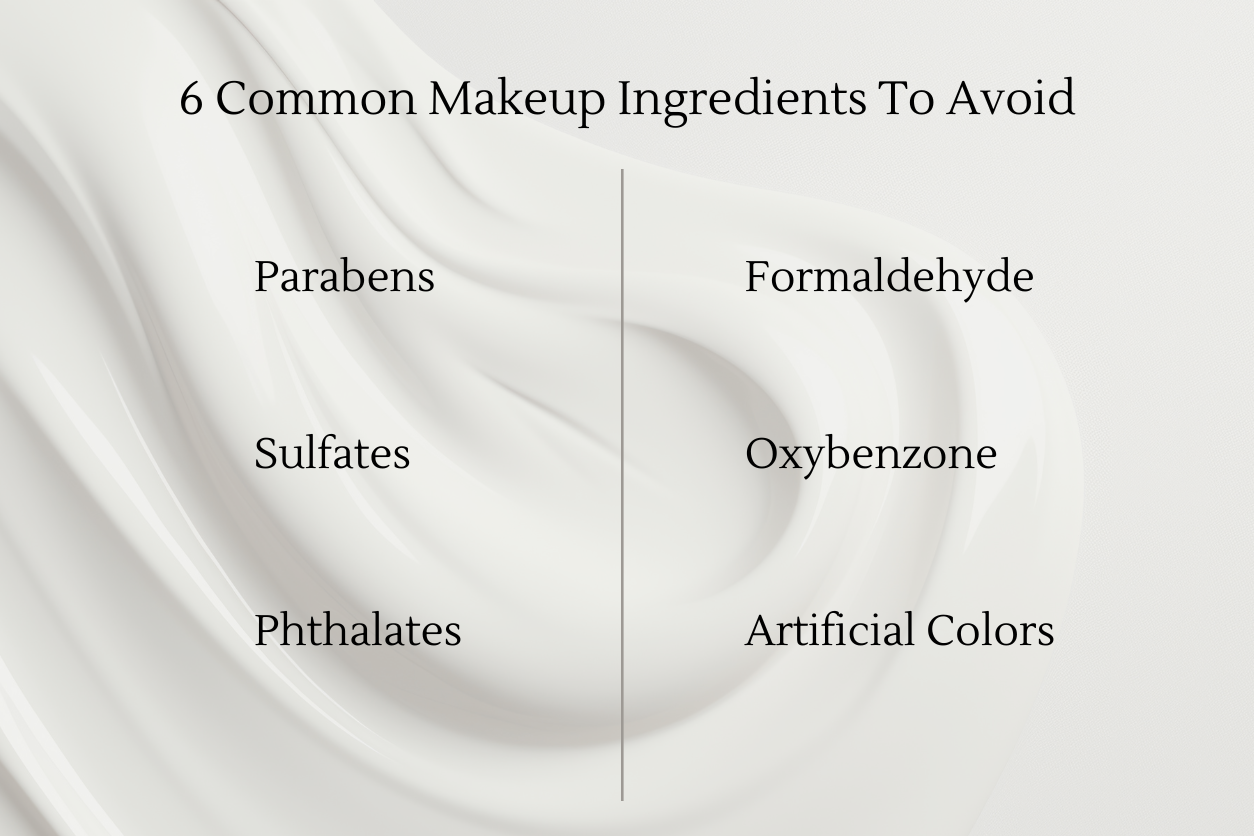6 Ingredients to ALWAYS Avoid In Makeup

When choosing makeup, most people focus on brands, prices, and recommendations from social media or friends. However, it’s equally important to be mindful of the ingredients in your cosmetics. Many makeup products contain chemicals and substances that can be harmful to your skin and overall health. By avoiding certain ingredients, you can protect your skin, reduce the risk of adverse reactions, and make more informed choices about the products you use. Here’s a guide to some of the key ingredients to avoid in makeup and why they matter.

1. Parabens
What They Are: Parabens are a group of synthetic preservatives used in cosmetics to prevent bacterial growth and extend shelf life. Common parabens include methylparaben, ethylparaben, propylparaben, and butylparaben.
Why to Avoid Them: Parabens have been linked to hormone disruption because they can mimic estrogen in the body. This potential disruption has raised concerns about their role in breast cancer and other health issues. Many experts recommend opting for paraben-free products to minimize these risks. If you are uncertain, the app Yuka is great for breaking down the ingredients in makeup and skincare products in its database. You are also able to scan the barcodes of products as well.
2. Sulfates
What They Are: Sulfates, such as sodium lauryl sulfate (SLS) and sodium laureth sulfate (SLES), are surfactants commonly found in cleansers and shampoos. They create a lathering effect that helps to remove dirt and oil.
Why to Avoid Them: Sulfates can be harsh on the skin and strip it of its natural oils, leading to dryness and irritation. For those with sensitive skin or conditions like eczema, sulfates can exacerbate these issues. Choosing sulfate-free products can help maintain your skin’s natural moisture balance.
3. Phthalates
What They Are: Phthalates are a group of chemicals used to make plastics more flexible and are often found in products like nail polish and hair sprays.
Why to Avoid Them: Phthalates have been associated with endocrine disruption and may affect reproductive health and fetal development. They can also contribute to allergic reactions and skin sensitivities. Opting for phthalate-free products can help reduce exposure to these potentially harmful chemicals.
4. Formaldehyde
What They Are: Formaldehyde is a known carcinogen sometimes used as a preservative in cosmetics. Formaldehyde-releasing preservatives, such as quaternium-15, DMDM hydantoin, and imidazolidinyl urea, slowly release formaldehyde to prevent microbial growth.
Why to Avoid Them: Formaldehyde is linked to skin irritation, allergic reactions, and cancer. Products with formaldehyde or formaldehyde-releasing preservatives can be particularly problematic for sensitive skin. Look for makeup labeled as formaldehyde-free to avoid these risks.
5. Oxybenzone
What It Is: Oxybenzone is a chemical used in sunscreens and other cosmetics to protect against UV radiation.
Why to Avoid It: Oxybenzone is known for its potential to cause skin allergies and endocrine disruption. It can also contribute to environmental damage, particularly to coral reefs. For safer sun protection, look for products with mineral-based sunscreens like zinc oxide or titanium dioxide.
6. Artificial Colors
What They Are: Artificial colors are synthetic dyes used to give cosmetics their vibrant hues. They are often labeled as FD&C or D&C followed by a color and number (e.g., FD&C Red 40).
Why to Avoid Them: Some artificial colors have been linked to allergic reactions and may contain harmful chemicals, such as coal tar derivatives. Natural or mineral-based colorants are often safer alternatives that provide the same cosmetic benefits without the associated risks.
In Conclusion — Stay Informed!
Being informed about the ingredients in your makeup is crucial to take care of your skin health. By avoiding potentially harmful substances, you can spend more time focusing on your makeup routine and worrying less. Always read ingredient labels carefully and opt for products with natural, non-toxic ingredients to ensure you’re using cosmetics that enhance your beauty without compromising your health.